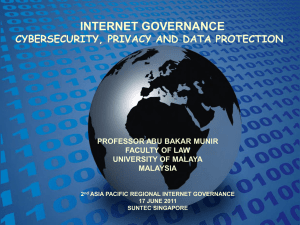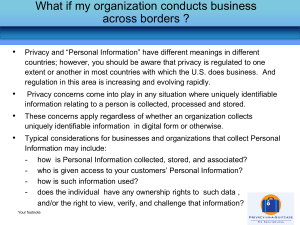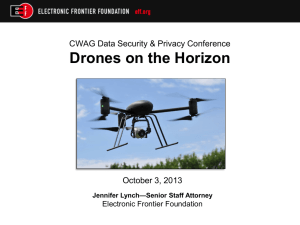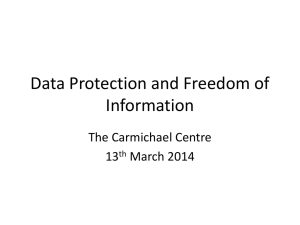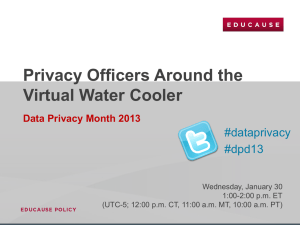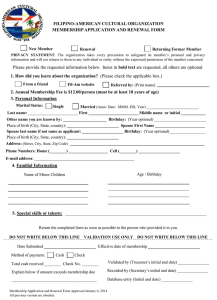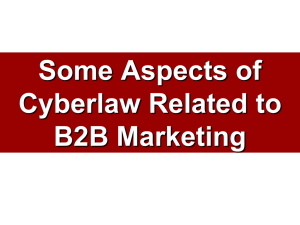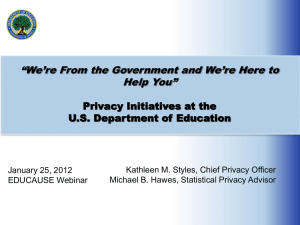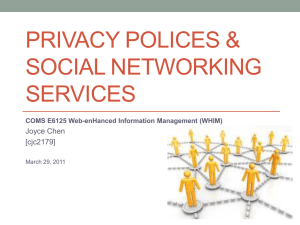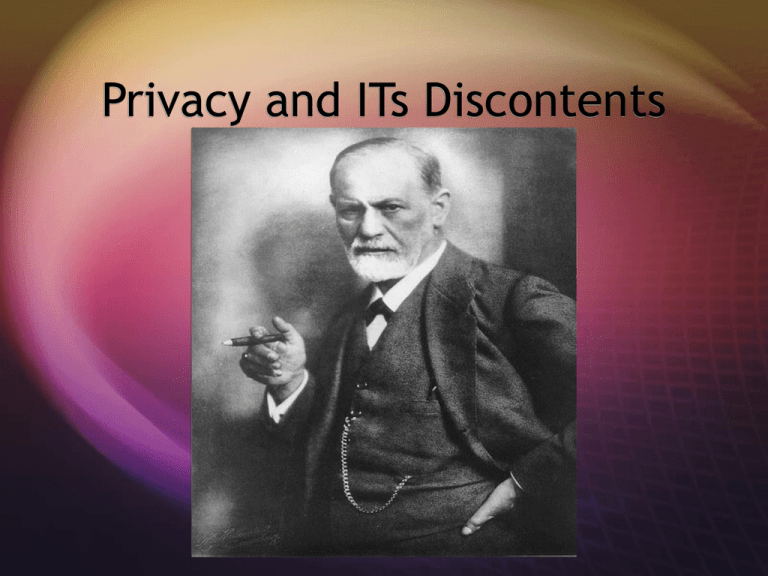
Privacy and ITs Discontents
Premise
“The liberty of the individual is no gift
of civilization. It was greatest
before there was any civilization,
though then, it is true, it had for
the most part no value, since the
individual was scarcely in a position
to defend it. The development of
civilization imposes restrictions on
it, and justice demands that no one
shall escape those restrictions.”
Sigmund Freud, Civilization and Its
Discontents, 1929
Argument
Neither technology nor the USAPatriot Act have dramatically taken
away your privacy
You never had much to begin with!
America society would benefit from
a meaningful and comprehensive
evaluation of the role that
“information” is playing in
economic, social, cultural and
political relations.
“Privacy” law is inadequate for the
task
Challenge
How can information (and its underlying
technologies) serve democratic
republican
values?
From whence “privacy” in
Western Culture?
Dynamic definition of culture
Control over nature
Interpreted though binary oppositions
Sex/Gender relations foundation
Women, because of childbearing
functions, become more closely
associated with nature, men with
culture
Therefore, men control women
Patriarchal/paternalistic societies
Western Civilization
Ancient Greece
Clear public/private distinctions
Grounded in sex/gender relations
Women constitute private, men public
“Democracy” as a government construct
originally built on this foundation
“I want to be alone…”
Brief History of Privacy in
Western Civilization
Ancient Rome
Great imitators of Ancient Greece
Recreated the public/private sphere split
“Privacy” derives from the Latin: to be let alone”
but applied only to the wealthy statesmen
With empirical twist
Great latifundia, or plantations
Slaves from conquest
“Citizens” of the Mediterranean
Medieval Society:Does hierarchy
equal respect? Dignity?
Dignity, based on Respect, based
on Hierarchy
Hierarchical, organic, interdependent,
cooperative political, social and
economic relations
Contrary of “individualism”
Theocracy, not a democracy
But respect and dignity, knights and ladies
Dignity and respect precursor to European
“privacy” society
American Privacy Law:
Quilt or Just Patchwork?
Civil Law:
Tort
“The Right to Privacy”
Warren and Brandeis, Harvard Law Review 1890
A tort grounded in property?
Defamation, Slander and Libel
“intrusion upon a individual’s seclusion”
“public disclosure of private facts”
“false light”
“private gain of individual identity”
*Contract law? Why not, copyright holders do!
No contest
First Amendment and entertainment and
media-driven society
Extremely high standard: no truth and
actual malice
Most people would be willing to see
their information for a tuppence
Constitutional Law
Fundamental Rights
Children’s schools, foreign language, no
castration…
Griswold v. Connecticut, 1965
Privacy as a “penumbra” of 1, 3, 4, 5, 9
Amendment rights
Married couples right to contraception
Extended to non-married couples a few
years later…
Constitutional Law
Roe v. Wade, 1973
Woman’s right to “privacy” in her own body,
decriminalizing abortion before viability
Note: the term “privacy” no where in the constitution,
therefore a construct of jurisprudence
Substantive due process
Equal protection jurisprudence
Lawrence v. Texas
Dignity?
The Fourth Amendment and
Electronic Communications
Katz v. U.S. (1967)
“Fourth Amendment protects people, not things”
Law enforcement must have a court order to tap
a phone line for content
Precursor to the Omnibus Crime Control and Safe
Streets Act of 1968, which was the…
Precursor to the Electronic Communications
Privacy Act of 1986
Kyllo (2001)
Technology does not trump sanctity of home.
Legislative and Regulatory
Privacy
Fair Credit Reporting Act (FCRA), Public Law
No. 91-508
accuracy, fairness, and the privacy of personal
information assembled by Credit Reporting
Agencies
Privacy Act of 1974
established rules for the collection, use and
disclosure of personal information held by
federal agencies and specifically prohibited data
matching of those government files
Privacy Legislation
Freedom of Information Act of 1972
Family Education Rights Privacy Act (FERPA)
of 1974
Computer Matching and Privacy Protection
Act of 1988
Video Privacy Protection Act of 1988
Communications Privacy Laws
Electronic Communications Privacy Act
of 1986
Wiretapping Act of Internet
Cable Communications Privacy Act of
1989
Telephone Consumer Protection Act of
1994
Subscriber’s records
Resurgence of Privacy Laws for
Selected Content
Health Insurance Portability
Accountability Act of 1996
Financial Modernization Act of 1999
Homeland Security Act of 2002
First federal statutory privacy officer
History tells a different story
about privacy:
The Sixteenth Amendment
The Draft
From New Deal to the Regulatory
State
Welfare
Aid to Dependent Families
Medicare
What does technology have to
do with it?
Digitization, meet packet switching, which hooks up
with Ethernets and networking systems and the
personal computer. Add hypertext transfer
protocols and hypertext markup language, popular
applications such as electronic mail, e-commerce
and file share programs to the recipe, transform
computing into communications, bake it through
the miasma of late twentieth, post-modern
American society and out comes the Information
Age.
Signing of the USA-PATRIOT Act
of 2001
USA-Patriot Act:
Basics
Uniting and Strengthening America by
Providing Appropriate Tools Required to
Intercept and Obstruct Terrorism Acts
Signed into law on October 26, 2001
One of the longest pieces of emergency
legislation passed in one of the shortest
periods of time in American history
The Basics
Ten Sections covering a variety of
areas, including banking, money
laundering, surveillance, border
protection, victims’ support,
information sharing within the
infrastructure and the strengthening
of criminal laws against terrorism.
Severability clause
To protect against the whole the
potential constitutional violation of a
single section
Definition of Terrorism
Act divides definition into two parts
Foreign
Domestic
For the purposes of our discussion, the
definition for domestic terrorism is the
more helpful to keep in mind.
Domestic
“the term `domestic terrorism' means
activities…[that ] involve acts dangerous to
human life that are a violation of the criminal
laws of the United States or of any State; appear
to be intended (i) to intimidate or coerce a
civilian population; (ii) to influence the policy of
a government by intimidation or coercion; or (iii)
to affect the conduct of a government by mass
destruction, assassination, or kidnapping; and
occur primarily within the territorial jurisdiction
of the United States…
Overview of Title II: Enhanced
Surveillance Procedures
Sharing of Information
Law enforcement with federal agencies
Obtaining Records
FERPA (507 of Title V)
FISA
ECPA
Rewording to Include Electronic
Communications
“routing,” “network addresses,”
“signaling”
Patriot Act Amends Existing
Legislation
FERPA
Family Education Records and Privacy Act 1974
FISA
Foreign Intelligence Surveillance Act 1978
ECPA
Electronic Communications Privacy Act 1986
Family Education Records and
Privacy Act
Originally passed in 1974, subseq.
amended
Historical foundation in anti-war
protests protection for students’
records, “transparency” and access
of those records for the individual
student
Recognize shift from in loco parentis
Already existing “health and safety”
exception for the individual student
New Exception to FERPA
U.S. Assistant Attorney General, or
similarly ranked, obtains a court order
relevant to terrorism investigation
Institution is not liable, no record need
be maintained
Distinct from “health and safety
exception” already existing
Ancillary to FERPA
National Center for Education Statistics
Federal officials can have access to survey
information, which is otherwise held
confidential
Monitoring of Foreign Students
Full implementation of existing
Immigration and Naturalization Service
law regarding information about students
SEVIS Program
Foreign Intelligence Surveillance Act
1978
Early recognition, if not prescience,
about the potential for terrorist
activities on American soil or affecting
American interests internationally
Terrorist exception to 4th A.
End-run around the constitution?
Foreign Intelligence Surveillance
Act
FISA Court (pre-Patriot Act)
Seven federal judges
Post Patriot Act: eleven and with
residence restrictions in contemplation of
an increase in requests and need for
quick process of them
Meet in closed session
Content of applications permanently closed
Example of Moussaoui Flight School case
Results in search warrant or subpoena
Post Patriot Act: reduced standard for
approval
Under total circumstances, that is the
issue
Foreign Intelligence Surveillance Act
1978
Core concept:
Possible to circumnavigate traditional
constitutional protections for search and
seizure if it is possible to establish that
the investigation is about “intelligence”
and/or a connection to a “hostile foreign
power;”
No showing of “probable cause” of
criminal activity necessary
Foreign Intelligence Surveillance Act
1978
Only statistics, and annual vice-president’s
report to Congress of applications and
approved;
Although records are sealed, annual reports
that the Vice President makes to Congress on
these warrants reveals that 13,000+ have
been issued, 1,000 in 2000 alone, and in that
time only one request has been turned
down.
Section 215
Business Records
FBI can seize with a court order certain
business records pursuant to an
investigation of “international terrorism
or other clandestine intelligence
activities…”
Prohibits record keeper to disclosure FBI
action to anyone “other than those
persons necessary to produce the
tangible things under this section…”
Investigation “not to be conducted of a
United States person solely upon the
basis of activities protected by the first
amendment…”
Electronic Communications
Privacy Act of 1986
What is it?
Wiretapping Act for the Internet
What is the “Wiretapping Act?”
Olmstead 1928
Katz 1967
Omnibus Crime Control and Safe Streets Act of
1968 is the actual “Wiretapping Act”
ECPA brings those same legal protections of
telephonic communications to electronic
environment
ECPA: What Does It Protect?
Ideally the privacy of communications in
electronic media
Pre-Patriot Act list of exceptions
Usual course of business
But not disclosure to third parties
Wireless: distinction between listening and disclosing
Authorized law enforcement
Court or Administrative Order
Search Warrant or Subpoena
Executive Order 12333 Letter
To Whom Does It Apply?
Statutory Language:
“…providers of Internet service to the
public”
Does it apply to colleges and
universities?
No case law on point
Anderson Consulting: EPCA does not
apply
Digital Millennium Copyright Act as
model for safe harbor distinctions?
General Rule
Act as if it does, but hold question as
potential defense
Patriot Act Amendments of
ECPA
New “emergency” disclosure
“Imminent danger to life and limb”
New “required disclosure”
“Rubber-stamping subpoenas”
Below “probable cause”
“Routing:” Pen registers and trap and trace devices
Content is the constitutional question
Patriot Act Amendments of
ECPA
New “Computer Trespass” Disclosure
Owner/Operator consent for federal
intervention
So long as owner/operator reasonably
believes investigation is relevant to computer
trespass
Investigation of it and no other
No authorization required
No limits set, e.g. stop
No restraint on return with authorization
based on information gathered during the
invited investigation
No guarantee it is constitutional
Sunset provision
Observations about the USAPatriot Act
Did not significantly diminish
privacy
Didn’t have much to begin with!
Given its exposure in these troubled
times, its best hope has been to make
people aware of how little privacy they
have…
And not only due to government
surveillance but, perhaps more so,
in the free market
Total Information Awareness and JetBlue
case as examples…
Observations on (Information)
Technologies
A “liberty” driven society and free
marketplace has exploited
technology for its ends
Telemarketers
Credit/Banking/Reporting
Spam
Technology not the cause of
diminished privacy
But it illuminates and exacerbates the
problem…if there is one?
Depends on your expectations…
How does technology change privacy
expectations?
Wireless
Open communications, who cares?
Cell phones
Remember the phone booth?
Internet
Cookies?
Trails?
Sniffing?
American Privacy Law? Forget about
it!
Patchwork, not a quilt
Not coherent or comprehensive
No overarching principles
Mired in complicated social issues, such
as “family…”
Have to be a criminal to get a little?
Exceptions swallow rules
Transcripts for jobs
Health care for benefits
Banking for a loan…
Does not take account of technology
and its impact on existing legal forms
property/privacy, copyright, criminal and
civil law…
Contrast Chapter I, Article 8: “Dignity” of
EU Human Rights…
Article 8 Protection of personal data 1.
Everyone has the right to the protection
of personal data concerning him or her. 2.
Such data must be processed fairly for
specified purposes and on the basis of the
consent of the person concerned or some
other legitimate basis laid down by law.
Everyone has the right of access to data
which has been collected concerning him
or her, and the right to have it rectified.
3. Compliance with these rules shall be
subject to control by an independent
authority.
Conclusion
Information age presents all kinds
of new legal and policy
challenges which require a
comprehensive assessment of
the dynamic relationship
between “information” and
economic, social, political and
cultural relations, with a focus
on service to our foundational
democratic republican vales.

